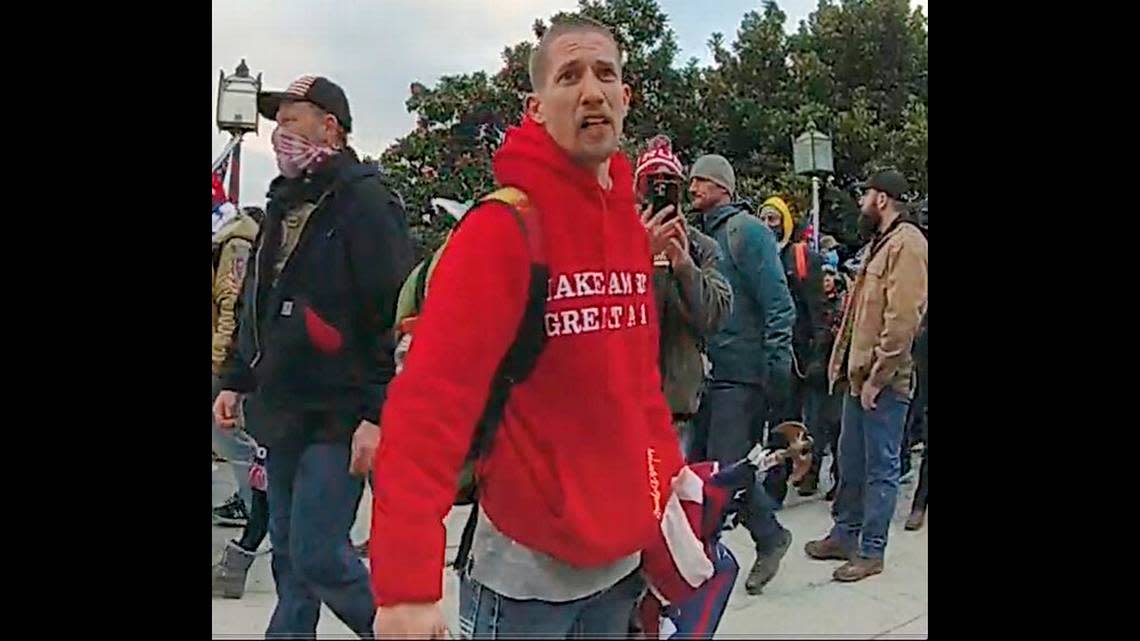Missouri, Kansas Jan. 6 cases thrown into question by Supreme Court

John George Todd III stormed the Capitol on Jan. 6, 2021. A jury of his peers in the U.S. District Court for the District of Columbia found the Blue Springs man guilty on six counts, including two felonies, and a judge sentenced him to five years in prison.
But the U.S. Supreme Court on Friday threw that jury verdict and sentencing into question, when it decided 6-3 to narrow the scope of a specific felony charge brought against Todd and more than 350 others who entered the Capitol and disrupted the certification of the 2020 presidential election.
The charge — obstruction of an official proceeding — was crafted by Congress in response to major accounting scandals in the early 2000s. In an opinion written by Chief Justice John Roberts, the court ruled that the charge can only be brought if the defendant “impaired the availability or integrity for use in an official proceeding of records, documents, objects, or as we earlier explained, other things used in the proceeding, or attempted to do so.”
Roberts said the Justice Department’s current, broad interpretation of the law could create a precedent for the government to bring serious, felony charges against any activist who tries to protest at the Capitol.
“That novel interpretation would criminalize a broad swath of prosaic conduct, exposing activists and lobbyists alike to decades in prison,” Roberts wrote. “As the Solicitor General acknowledged at oral argument, under the Government’s interpretation, a peaceful protester could conceivably be charged under §1512(c)(2) and face a 20-year sentence.”
Attorney General Merrick Garland said in a statement that the ruling would not effect the majority of the more than 1,400 defendants charged with their role in the Capitol riot.
“There are no cases in which the Department charged a January 6 defendant only with the offense at issue in Fischer,” Garland said. “For the cases affected by today’s decision, the Department will take appropriate steps to comply with the Court’s ruling”
But the court’s decision — in which liberal Justice Ketanji Brown Jackson concurred with Roberts and Justices Samuel Alito, Clarence Thomas, Neil Gorsuch and Brett Kavanaugh — still complicates hundreds of cases, including a federal charge against former President Donald Trump, brought by Special Prosecutor Jack Smith.
Trump has yet to stand trial on the charges — the Supreme Court is currently deciding whether a former president maintains immunity after he leaves office. But most of the nine defendants from Missouri and Kansas charged with obstruction of an official proceeding have either pleaded guilty or stood trial.
Four have been found guilty of the charge — Todd; Nicholas Kennedy, of Sikeston; Matthew Loganbill, of Versailles; and William Chrestman, of Olathe. Four others pleaded guilty to lower charges. Only one, William Pope, of Topeka, has yet to stand trial.
Roger Roots, an attorney representing Todd, said Friday that he would move quickly to try and overturn his client’s conviction.
“The Supreme Court definitely got it right,” Roots said. “The Department of Justice selected the 1512 statute to use against January 6ers solely for the purposes of obtaining lengthy sentences. The statute had never previously been used against political demonstrators who disrupt government functions. I’m glad the Supreme Court recognized that the DOJ was twisting the statute out of context.”
But in Todd’s case, the most severe penalty was for his felony charge of assaulting an officer and causing bodily injury — which could mean the Supreme Court’s decision does not have a substantial impact on Todd’s sentence.
The ruling is also expected to complicate the sentences of both Kennedy and Loganbill. Kennedy is scheduled to be sentenced Aug. 28 and Loganbill’s sentencing was delayed until after the Fischer decision came down.
Pope filed a motion to continue his trial from the scheduled July 22 date but the request was denied. Among his arguments for doing so, he said, was that “there is a strong possibility that the Supreme Court ruling will alter the outcome of my case.”
Pope responded to the Supreme Court ruling on X, formerly known as Twitter, shortly after it was issued.
“For almost four years, Biden’s extreme DOJ has falsely accused me of a 20-year felony based on their egregious, unbounded reading of the law,” he said. “Many defendants have served time in prison for this charge. Today the Supreme Court rightly reprimanded the government for their tyranny.
“Never forget that some January 6 defendants took their own lives when they were wrongly charged with the 20-year felony that did not apply. Others spent years in prison. All have been defamed by their own government.This tyranny can never be allowed to happen again.”
It is unclear what will happen to Chrestman, who was sentenced to 55 months in prison and is set to be released Dec. 18. He’s been in custody since his arrest in February 2021. His attorney did not immediately respond to a request for comment.
In her dissent, Justice Amy Coney Barrett, joined by liberal Justices Elena Kagan and Sonia Sotomayor, accused the majority of doing “textual backflips” in order to reach their decision in the case.
“The Court does not dispute that Congress’s joint session qualifies as an “official proceeding”; that rioters delayed the proceeding; or even that Fischer’s alleged conduct (which includes trespassing and a physical confrontation with law enforcement) was part of a successful effort to forcibly halt the certification of the election results,” Barrett wrote.
“Given these premises, the case that Fischer can be tried for “obstructing, influencing, or impeding an official proceeding” seems open and shut. So why does the Court hold otherwise?”
